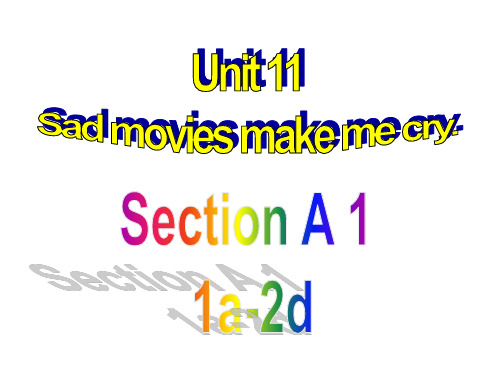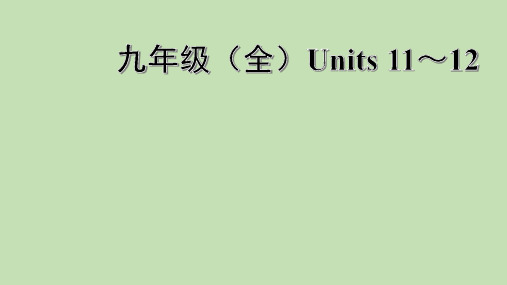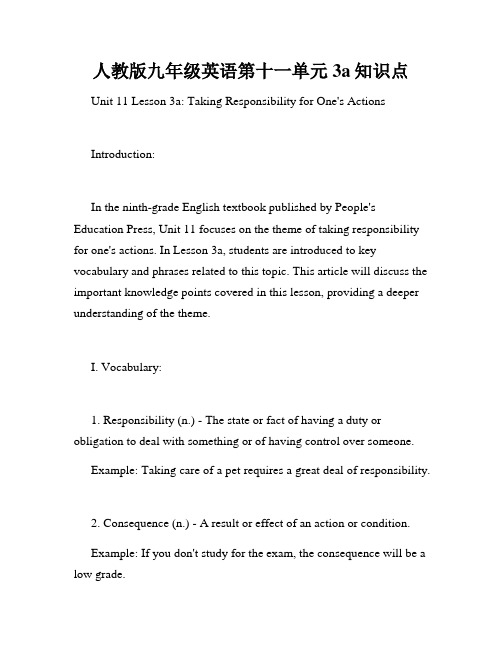人教版九年级英语第11单元知识点
人教版九年级英语unit11第十一单元全单元课件

Those awful pictures Let’s go to the Rockin’ on the walls make me
Restaurant. I love their uncomfortable, and
hamburgers.来自the loud music makes
me nervous.
1c Role-play a conversation between Amy and Tina.
I’d rather go to Blue Ocean because I like to listen to quiet music while I’m eating.
But that music makes me sleepy. I want to have the hamburgers at Rockin’Restaurant.
Tina
2d Role-play the conversation. Hey, Bert. I think I’ve made Alice mad and I’m not sure what to do about it.
What happened?
• 第二课时
king power prime minister banker fame pale queen call in examine palace wealth to start with grey lemon
11 tell sb to do sth
告诉某人去做某事
• 10 more important 更重要 less important 不太重 要
• 12 find—found—found come—came—come
• say –said—said buy—bought--bought
人教版九年级英语Unit11单元知识点梳理

Unit 11 Sad movies make me cry.一、短语:1.make me sleepy使我困倦2.drive sb.crazy使……发疯3.the more…,the more越……越……4.yes and no好坏参半5.be friends with sb.是某人的朋友6.feel left out感觉被忽视7.sleep badly睡眠很差8.don’t feel like eating不想吃东西9.for no reason毫无理由10.neither…nor…既不……也不……11.let…down使…...失望12.take one's position替代我的职位13.to start with起初14.get the exam result back取考试成绩单15.find out发现16.remain unhappy forever仍旧永远不幸福17.a shirt of a happy person一件快乐人的衬衫二、知识点:1.would rather意为“宁愿……”,表示句子主语的愿望、选择,后接省去to 的不定式,如He’d rather join you in the English Group.他宁愿加入到你的英语小组中来。
如果表示“宁愿(可)……也不愿……”,则用句型would rather…than…。
在would rather和than后面所连接的两个对比部分一般要一致,如The brave soldier would rather die than give in.那个勇敢的士兵宁死不屈。
2.使役动词make的用法常见于以下结构:①make+名词(代词)+省略to的动词不定式,如My parents often make me do some other homework.我父母常让我做些其他的作业。
这一结构中的不定式短语在主动结构中是宾语补足语,必须省去to,变为被动结构时,不定式短语作主语补足语,这时必须带to,如She was made to work for the night shift.她不得不上夜班。
人教版九年级英语第十一单元 Sad movies make me cry Section A教案

人教版九年级英语第十一单元Sad movies make me crySection A教案一、重点单词:1. friendship友谊2.king君主3. pale苍白的4. queen王后5. examine检查6nor也不7. palace王宫8. power权力9. wealth财富10. grey阴沉的11.lemon柠檬12. fame名声13. Prime首相的二、重点词组1. make me sleepy 使我困倦2. drive sb. crazy使…发疯3. the more…, the more 越…越…4. yes and no好坏参半好坏参半5. be friends with sb 是某人的朋友6. feel left out感觉被忽视三、重点句式1. I’d rather go to Blue Ocean because I like to listen to quiet music while I’m eating. But that music makes me sleepy.2. Waiting for Amy drove Tina crazy.3. The movie was so sad that it made Tina and Amy cry.4. Sad movies don’t make John cry. They just make him want to leave quickly.四、make 的用法Section A 1 (1a-2d)1. I’d rather go to the Blue Ocean Restaurant because I like to listen toquiet music while I’m eating.would rather do sth.,意为“宁可,宁愿还是……好些”。
e.g. I’d rather play tennis than swim.比起游泳我宁愿去打台球。
人教版九年级英语第十一单元知识点汇总

Unit 11 Sad movies make me cry.常用短语1.be friends with sb.成为某人的朋友2.wait for等待3.loud music高亢的音乐municate with sb.与某人交流5.be sure确信;确定6.neither...nor...既不……也不……7.have...in common有……共同点8.each time每次;每当9.leave out忽略;不提及;不包括10.feel left out感觉被忽略11.a long time ago很久以前12.feel like=would like想;想要13.one day有一天14.cry for no reason无缘无故地哭泣15.take one’s position=take sb’s place取代某人;代替某人16.in three days’ time在三天的时间里17.to start with起初;开始时18.clean up打扫19.a person with power and money有权有钱的人20.even though尽管21.on the school soccer field在学校的足球场上22.let...down让……失望23.as soon as一……就……24.knock on=knock at敲25.be hard on sb.对某人苛刻;对某人要求严厉26.learn from向……学习27.the next day第二天28.rather than=instead of而不是29.in one’s heart在某人心中30.be close to几乎处于某种状态;很快就要做某事31.pull together=work hard together齐心协力;通力合作32.to one’s surprise and relief令某人吃惊和欣慰的是33.in agreement同意34.put pressure on sb.向某人施加压力35.give up放弃36.in front of在……前面37.get into a fight with与……打架38.offer sb.sth.=offer sth.to sb.=provide sth.for sb.=provide sb.with sth.给某人提供某物39.kick sb.off开除某人40.let sb.in让某人进入41.agree with sb.同意某人42.have fun玩得开心;过得愉快43.call in召来;叫来44.would rather do sth 宁愿做某事45.drive/make sb+adj 使某人......46.drive sb to do sth 迫使某人做某事47.make sb do sth 使/让某人做某事48.try to do sth 尽力做某事try doing sth 尝试做某事49.yes and no好坏参半50.for no reason 毫无理由知识点梳理1.I’d rather go to the Blue ocean because I like to listen to quiet music while I’m eating.我宁愿去蓝海洋因为我喜欢在吃饭时听安静的音乐。
2019-2020年人教版九年级英语Unit 11 Sad movies make me cry 单

2019-2020学年人教版九年级英语单元知识点总结与练习Unit 11 Sad movies make me cry一、必记词汇(背)friendship友谊king国王power权利;力量banker银行家queen王后;女王palace王宫wealth财富lemon柠檬weight重量;分量shoulder肩;肩膀goal球门;射门;目标coach教练courage勇敢;勇气agreement同意drive迫使examine检查kick踢;踹pull拖;拉nod点头disappoint使失望pale苍白的;灰白的grey阴沉的;灰色的uncomfortable使人不舒服的;令人不舒适的二、必记短语(背)would rather 宁愿drive sb. crazy/mad 使人发疯、发狂the more...the more...越...越... be friends with sb. 成为某人的朋友leave out 忽略;不提及;不包括prime minister 首相;大臣call in 召来;叫来neither...nor...既不...也不...to start with 起初;开始时let...down...使失望kick sb. off 开除某人be hard on sb. 对某人苛刻;对某人要求严厉rather than 而不是pull together 齐心协力;通力合作三、常考句型1. I’d rather go to Blue Ocean because I like to listen to quite music while I’m eating.我愿意去蓝色海洋餐馆,因为我喜欢在吃饭时听安静的音乐。
2. Well, the more I get to know Julie, the more I realize that we have a lot in common.嗯,我越了解朱莉,就越意识到我们之间有许多的共同点。
2021--2022学年人教版英语 九年级(上) Units 11~14单元重难点梳理

20. _a_i_r_p_o_r_t_ n.机场 21. __b__ea_n___ n.豆;豆荚 22. _m__a_r_k_e_t_ n.市场;集市 9次 23. __o_ff_i_c_er__ n.军官;官员
11. oversleep(v.) →__o_v_e_r_s_le_p_t__(过去式/过去分词)睡过头;睡得太久 12. fool(v.)愚弄→___f_o_o_li_s_h___(adj.)愚蠢的 (n.)蠢人;傻瓜 ★fool sb.愚弄某人
动词短语 1. 使人发疯/发狂__d_r_iv_e__sb__. _cr_a_z_y_/_m_a_d__ 2. 忽略;不提及;不包括____le_a_v_e_o_u_t_____ 3. 召来;叫来_____ca_l_l_i_n______ 4. 使失望___l_e_t._.._d_o_w_n_____ 5. 开除某人___k_i_c_k_s_b_._o_f_f___ 6. 齐心协力;通力合作___p_u_ll_t_o_g_e_t_h_e_r__
名词短语 12. 首相;大臣_p_r_i_m_e__m_i_n_i_st_e_r__ 介词短语 13. 成为某人的朋友__b_e_f_r_ie_n_d_s_w__it_h__s_b_. 14. 起初;开始时__t_o_s_t_a_r_t_w_i_th____ 15. 在……以前__b_y__th_e__ti_m__e._..___ 16. 与……成一排__i_n_l_in__e_w_i_t_h____ 17. 在(某时间点)以前__b_y__th__e_e_n_d__o_f __
人教版九年级英语第十一单元3a知识点

人教版九年级英语第十一单元3a知识点Unit 11 Lesson 3a: Taking Responsibility for One's ActionsIntroduction:In the ninth-grade English textbook published by People's Education Press, Unit 11 focuses on the theme of taking responsibility for one's actions. In Lesson 3a, students are introduced to key vocabulary and phrases related to this topic. This article will discuss the important knowledge points covered in this lesson, providing a deeper understanding of the theme.I. Vocabulary:1. Responsibility (n.) - The state or fact of having a duty or obligation to deal with something or of having control over someone.Example: Taking care of a pet requires a great deal of responsibility.2. Consequence (n.) - A result or effect of an action or condition.Example: If you don't study for the exam, the consequence will be a low grade.3. Peril (n.) - Serious and immediate danger.Example: Climbing without proper equipment can put your life in peril.4. Stellar (adj.) - Exceptionally good; outstanding.Example: The students' stellar performance in the school play impressed everyone.II. Phrases:1. Take responsibility for - To accept and acknowledge one's actions or mistakes.Example: It's important to take responsibility for your actions instead of blaming others.2. Face the consequences - To accept and bear the results of one's actions.Example: If you cheat on a test, you must be prepared to face the consequences.3. Learn a lesson - To gain knowledge or wisdom from a negative experience.Example: After failing the exam, she learned a valuable lesson about the importance of studying.III. Cultural Knowledge:In addition to vocabulary and phrases, Lesson 3a also explores cultural aspects related to taking responsibility. The lesson introduces the concept of personal responsibility as a fundamental value in Western societies. Students learn about the saying, "If you break it, you buy it," which is a common belief in many Western countries. This reflects the idea that individuals should take responsibility for their actions and be accountable for any damages they cause.IV. Practical Application:Taking responsibility for one's actions is not only important in the classroom but also in everyday life. Engaging students in practical activities can help them apply what they have learned. Teachers can organize group discussions or role-playing exercises to simulate real-life situations where students must take responsibility and face theconsequences of their choices. This practical application helps students understand the significance of personal accountability and encourages them to develop a sense of responsibility.Conclusion:Unit 11 Lesson 3a of the People's Education Press ninth-grade English textbook provides valuable knowledge and phrases related to taking responsibility. By understanding the vocabulary and phrases presented in the lesson, as well as the cultural significance of personal responsibility, students can develop a deeper understanding of this important life skill. Teachers can enhance the learning experience by incorporating practical activities that allow students to apply their knowledge and learn from their mistakes. Taking responsibility for one's actions is essential for personal growth and long-term success.。
(完整版)人教版九年级英语第十一单元知识点总结

人教版九年级英语第十一单元知识点总结Unit 11 Sad movies make me cry一.1.rather adv 可修饰形容词及它的比较级 a little,much,a bit,even,still注意:副词可用来修饰动词,形容词,副词。
2.prefer to do sth rather than do sth=prefer doing sth to(doing) sth =would rather do sth than do sth=would do sth rather than do sth All students prefer to take the bus rather than walk.=All students prefer taking the bus to walking.=All students would rather take the bus than walk.=All students would take the bus rather than walk.Would rather用法1)would rather“宁愿;宁可;更喜欢”,后跟动词原形would rather do sth. =prefer to do sth. I would rather stay at home because it’s cold outside.否定句:would rather not do sth 宁愿不做某事2).一般过去时表示现在或将来的愿望I’d rather you went tomorrow (now). 我宁愿你明天(现在)去。
I’d rather you came next Saturday. 我宁愿你下星期六来。
3).用过去完成时表过去的愿望I’d rather you hadn’t said it. 我真希望你没有这样说过。
I’d rather you hadn’t done that. 我宁愿你没这样做。
- 1、下载文档前请自行甄别文档内容的完整性,平台不提供额外的编辑、内容补充、找答案等附加服务。
- 2、"仅部分预览"的文档,不可在线预览部分如存在完整性等问题,可反馈申请退款(可完整预览的文档不适用该条件!)。
- 3、如文档侵犯您的权益,请联系客服反馈,我们会尽快为您处理(人工客服工作时间:9:00-18:30)。
九年级英语Unit11
1.宾语从句宾语从句在复合句中作主句的宾语。
①由连接词+ 主语+ 谓语构成
常由下面的一些连接词引导:
②由that 引导表示陈述意义that 可省略
He says (that) he is at home. 他说他在家里。
③由if , whether 引导表示一般疑问意义(带有是否、已否、对否等)
I don’t know if / whether Wei Hua likes fish.
我不知道韦华是否喜欢鱼。
④由连接代词、连接副词(疑问词) 引导表示特殊疑问意义
Do you know what he wants to buy? 你知道他想要买什么吗?
⑤从句时态要与主句一致
当主句是一般现在时,从句根据情况使用任何时态
He says (that ) he is at home. 他说他在家里。
I don’t know (that) she is singing now. 我不知道她正在唱歌。
She wants to know if I have finished my homework.
她想要知道我是否已经完成了我的作业。
Do you know when he will be back? 你知道他将会什么时候回来?
当主句是一般过去时,从句应使用过去某时态(一般过
去时,过去进行时,过去将来时,过去完成时)
He said (that) he was at home. 他说他在家里。
I didn’t know that she was singing now. 我不知道她正在唱歌。
She wanted to know if I had finished m homework.
她想要知道我是否已经完成了我的作业。
Did you know when he would be back? 你知道他将会什么时候回来?
2. get v. 得到、买、到达
3. make a telephone call 打电话
4. save money 省钱、存钱
5. ①问路常用的句子:
Do you know where …is ?
Can you tell me how can I get to …?
Could you tell me how to get to …?
②Can/Could/Will/Would you please tell me sth.
表示十分客气地询问事情
③Could you tell me how to get to the park?
请你告诉我怎么才能去邮局好吗?中的how to get to the park
是疑问词与动词不定式连用,用作宾语,但不是宾语从句,可是
相当于how I can get to the park(宾语从句)如:
I don’t know how to solve the problem. ==
I don’t know how I can solve the problem.我不知道如何解决这个问题Can you tell me when to leave? ==
Can you tell me when I ill leave? 你能告诉我什么时候离开?
6. 日常交际用语:
take the elevator / escalator to the … floor.乘电梯/自动扶梯到…楼turn left / right === take a left / right 向左/ 右转
go past 经过go straight 向前直走
7. next to旁边、紧接着如:Lily is next to Ann. 莉莉就在安的旁边。
8. between … and…在…和…之间
如: Lily is between Ann and Tom. 莉莉就在安和汤姆的之间。
9. decide to do 决定做…
She decided to go to have lunch. 她决定去吃午餐。
decide v. decision n.
make a decision 做个决定
10. Is that a good place to hang out? 那是不是一个闲荡的好地方?
中的to hang out修饰前面名词place,不定式作定语.
如:There are something to eat. 这有吃的东西。
中的to eat修饰代词something,作定语.
11. kind of +adj./ adv. 译为“有点、一点”
如:She is kind of shy. 她有点害羞。
12. expensive 贵的反义词inexpensive 不贵的
13. crowded 拥挤的反义词uncrowded 不拥挤的
14. take a vacation == go on a vacation 去度假
15. dress up 打扮dress up as 打扮成..
如:He wanted to dress up as Father Christmas.
他想要打扮成圣诞老人。
16. on the beach 在海滩上的介词用on
17. politely adv. 有礼貌地polite adj. 有礼貌的
18. depend on sth / doing / 从句根据、依靠、依赖、决定于
Living things depend on the sunlight.生物对阳光有依赖性。
We can’t depend on his answer. 我们不能根据他的回答。
That depends on how you did it. 那决定于你怎样做这件事。
19. prefer动词更喜欢宁愿常用的结构有:
prefer sth.更喜欢某事I prefer English. 我更喜欢英语。
prefer doing/ to do宁愿做某事I prefer sitting/ to sit.我宁愿坐着。
prefer sth to sth. 同…相比更喜欢… I prefer dogs to cats.
与猫相比我更喜欢狗。
prefer doing to doing宁愿做某事而不愿做某事
I prefer walking to sitting. 我宁愿走路也不愿坐着
prefer to do rather than do 宁愿做某事而不愿做某事
I prefer to work rather than be free. 我宁愿工作而不愿闲着。
20. on the other hand 另一方面
21. 把…借给某人
lend sb. sth. ==lend sth.to sb. 如:
Lily lent me her book. == Lily lent her book to me .
莉莉把她的书借给了我。
22. such as 例如
23. I’m sorry to do sth. 对做某事我觉得很抱歉、伤心。
24. in a way 在某种程度说
25. in order to do为了做…表目的如:
He got up early in order to catch the first bus.
他起早床,是为了赶上头班公共汽车。
26. 等级/同级比较:as…as ,not as/so…as
①as + 形容词/ 副词原级+ as
表示“和…一样的…”“…和…一样的…”
如:He works as hard as we. 他工作和我们同样努力。
②否定式:not as + 形容词/ 副词原级+ as
== not so + 形容词/ 副词原级+ as
He doesn’t work as / so hard as we. 他工作没有我们那样努力。
27. hand in 上交。
